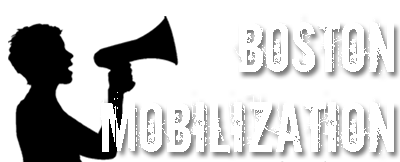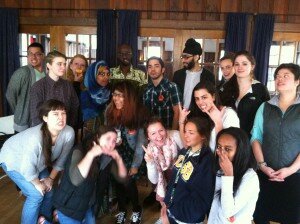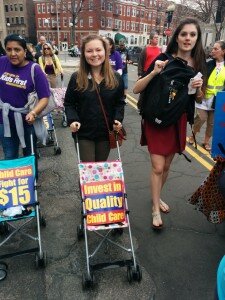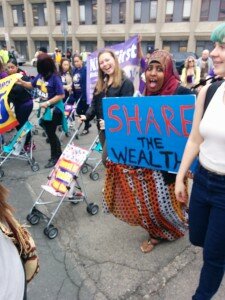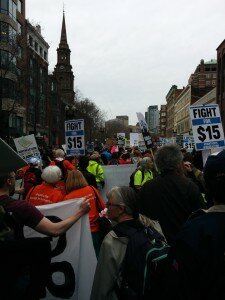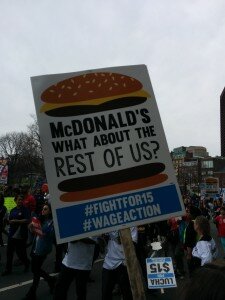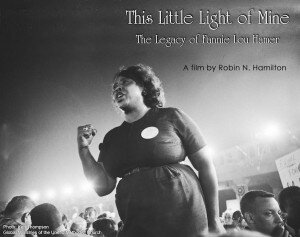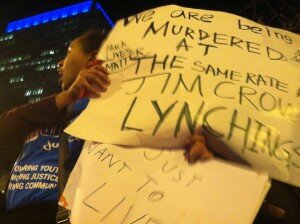
Friends,
It is with a heart full of joy and sadness that I write you today announcing my departure from Boston Mobilization. It’s been 10 wonderful years, and we are ready for inspired new leadership to achieve our next level of growth. I leave the organization on good terms, and in good hands with an amazing staff team and a strong Board of Directors.
Boston will remain my home, and I will continue working for justice (not sure what’s next yet!). I hope to remain in relationship with you as we work together to build the world we wish to live in. I am deeply grateful to you for the many ways you have supported us over the years, including giving so generously of your time, your money and your wisdom.
Longer Story: Boston Mobe was founded in 1977. I first heard about the organization in 2006. I liked their work with teens, helped out on a racial justice training with the Belmont METCO program, and asked if the organization needed any other help. At the time I was teaching in BPS and starting to build the Sub/Urban Justice program with Ted Cullinane and a few other folks. Mobe needed a book-keeper, so I started working for them 4 hours a month. Suddenly the organization experienced a rapid turnover in leadership, and within a year we had no money in the bank, our programming stalled out, all of our internal systems collapsed, remaining staff left the organization, and the Board dissolved. By early 2008 I became an accidental Executive Director, sure that Boston Mobilization would close on my watch.
Something magical happened instead. I kept meeting people all over Boston who remembered Mobe fondly, who had found a political home there in the late 70s, the 80s or the 90s, and who wanted us to keep going. Long-time supporters kept mailing in checks, even when we hadn’t sent them an appeal. Friends of the organization talked about the historical work of politicizing the next generation of organizers and social justice thought leaders. I introduced the fledgling Sub/Urban Justice program, and started teaching myself the basics of fundraising. I had to learn about all the other aspects of being an Executive Director. I’ve never loved the ED role, but over the past 8 years, we’ve grown to a robust organization with healthy systems and 4.5 staff. We have done amazing things and are poised for exciting growth in the years to come.
Even Longer Story: My salary that first year was $13,245 dollars, and I was on food stamps. Our first summer we partnered with The City School, a partnership that continues to this day, and our 14 teens talked about race and class constantly. We literally had to kick them out at the end of each day. Ted, Donna Desilus and I had planned to cover community organizing, but we couldn’t get those 14 teens to stop talking about racism and classism. Most of them are still working for justice to this day, including Will Poff-Webster on our Board of Directors and Mariko Dodson as our Program Coordinator. I realized my background in organizing wasn’t strong enough, so I signed up for JOIN’s Organizing Fellowship.
That fall our young people launched our first school-year program, bringing together teens from two economic sides of Jamaica Plain to fight gentrification. That winter, Boston announced $75 million dollars in school budget cuts, and suddenly we were in the middle of our first organizing campaign. Our teens, with no adults involved, launched a protest at the Mayor’s State of the City Address. The Superintendent called those teen leaders into meetings. Two months later we were part of a city-wide youth coalition and seated around a table with Mayor Menino demanding a restoration of school funds. Nick Parker later told me how powerful he felt when he noticed Mayor Menino taking notes during the meeting – only to realize the Mayor was just doodling. This was an abject lesson in power – if you don’t have enough, they’ll do what they please. Nonetheless, teen leaders pressed on and helped convince their legislators to pass laws raising taxes to fund education. Boston now has a 1.25% tax on all restaurant meals to fund Boston’s school budget. We shared that victory with amazing youth organizers from the Chinese Progressive Association, Sociedad Latina, Boston Student Advisory Council and Hyde Square Task Force.
Next summer our teens dreamed up the award-winning anthology of anti-racism stories, Speak Up! Our student-created book sold over 2,000 copies in the past 7 years, and inspired the 2014 Out Of The Blue anthology. People began turning to us for cutting-edge social justice workshops, more and more each year (71 workshops in 2015, and on track to exceed that in 2016). We built a partnership with YouthForce and the JCRC and launched the YMORE (Youth of Massachusetts Organizing for a Reformed Economy) coalition, winning powerful victories for youth jobs funding, reducing toxic diesel emissions and increasing progressive revenue. In 2014 our youth leaders pushed for an increase in the minimum wage, bringing MA to the highest state minimum wage in the country, with teen leaders like Aimee Chan and Fatuma Mohamed meeting with the Speaker of the House at a critical moment in that campaign.
In the past 10 years we have run hundreds of legislative meetings, won significant policy changes, built strong coalitions, marched in the streets and trained thousands and thousands of people. We’ve rarely stepped out front in these campaigns, and that’s intentional. The name of our program, Sub/Urban Justice, represents our recognition that building a network to cross difference and geography is a pathway to increased power and possibility.
We’ve built powerful community across difference. Our young people come from every corner of Boston and all it suburbs. Ipswich? Framingham? Sharon? Needham? Medford? Malden? Winchester? Yup. And of course, Boston and its immediate suburbs. In the past 2 years we opened our first robust chapter out of the Brookline Teen Center, and are currently in talks with Somerville and Cambridge to do the same. This past year we launched the Social Justice Leadership Institute, engaging more than 150 teens from 15 different New England independent schools to spark culture shift at their institutions. In 10 years we’ve worked closely with more than 1,000 young people, and trained more than 10,000. We’ve won and won and won. Sometimes we’ve lost. In doing so we have learned.
We could not have done any of that without you. Really. I feel tremendously grateful to have been part of a movement for social change, to be part and partnered with so many incredible organizations, change makers, and most of all the incredible young people who have made every day for me a day of hope. I would start naming names, but I’d leave out so many people that I won’t even start. You teens remind me of Arundhati Roy’s famous words. “Another world is not only possible, she is on her way. On a quiet day you can hear her breathing,” and crying and laughing hysterically and fighting passionately for the things they believe in. And winning. And loving themselves. And loving one another.
I’m excited for the next steps on my personal journey. I don’t have anything lined up (I’m open to suggestions!) and I’m not leaving Boston or the work for justice. I hope you’ll stay in touch with me, and with Boston Mobilization.
If you’re still reading, thank you again.
Peace, Love and Transformation,
Chris Messinger
Executive Director
